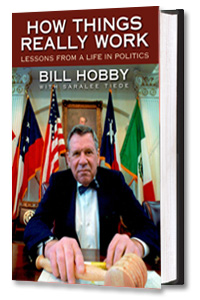The U.S. House of Representatives seems to be thinking about censuring President Clinton. It has ample precedent for so doing.
Just 166 years ago, the House of Representatives censured (reprimanded) another former Southern governor, soon to be a President. That former governor had abandoned his office, had well-publicized marital problems, and was accused of using Presidential favoritism to get a government contract to provide rations for Indians. He was convicted by the House of violating the U.S. Constitution by attacking a Congressman, but acquitted of the charge relating to the contract. The President of the United States tried to keep the trial in the House of Representatives from happening. A famous lawyer represented the once-and-future governor.
The defendant was Sam Houston. The President was Andrew Jackson. The lawyer was Francis Scott Key.
The episode began on March 31, 1832, when Congressman William Stanbery of Ohio asked on the floor of the House “Was not the late Secretary of War removed because of his attempt fraudulently to give Governor Houston the contract for Indian rations?”
On the evening of April 13 Houston beat Stanbery with a hickory cane on Pennsylvania Avenue in Washington. Stanbery drew his pistol and tried to shoot Houston. The pistol misfired. Had Stanbery known how to use a gun we might be living in northern Coahuila.
The next day Stanbery complained to House Speaker Andrew Stevenson that he (Stanbery) had been “attacked, knocked down by bludgeon, severely bruised and wounded by Samuel Houston, late of Tennessee, for words spoken in my place in the House of Representatives.” And so he had.
The U.S. Constitution says that a member of Congress shall not be held accountable elsewhere for what he says on the floor of Congress. The best Key could say in Houston’s defense was that Houston had beaten Stanbery, not for words said on the floor of the House, but for words attributed to him in a newspaper. The words were the same.
The trial at the bar of the House began April 19, 1832. Like the current Clinton hearings, the trial lasted a month and was the center of attention in Washington. “Everything else in the current news was eclipsed,” wrote Houston biographer Marquis James. Niles’ Register, a Baltimore paper that covered Congress fully, fell days behind its coverage of regular Congressional proceedings because it devoted so much space to the Houston trial.
Senator Buckner of Missouri testified that when Houston had almost finished caning Stanbery he lifted the Congressman’s feet into the air and “struck him elsewhere”. The witness, so phrased his testimony because ladies were present at the trial. (Compare the references to body parts in the Starr report.)
Nevertheless, the Register deprecated “a public taste so thirsty for details of this raffish proceeding.”
The House found Houston guilty, 106-89, and sentenced him to be reprimanded by the Speaker, who carried out the sentence on May 14, 1832.
Stanbery, showing more fight than ever he did on Pennsylvania Avenue, then charged Houston with assault. Houston paid a $500 fine. A House committee, even though chaired by a hostile Stanbery, investigated the Indian ration contract for six weeks and decided that “(former Secretary of War) John H. Eaton and Samuel Houston do hereby stand entirely acquitted of any imputation of fraud.”
Speaking of the Stanbery affair later, Houston said “I was dying out and had they taken me before a justice of the peace and fined me ten dollars it would have killed me; but they gave me a national tribunal for a theatre, and that set me up again.”
Houston had been a Congressman from Tennessee, then its Governor. He left Tennessee and its Governor’s office because of problems in his eleven-week-old marriage to Eliza Allen.. The problems, apparently sexual, have never been fully identified. Nor are they anybody’s business, any more than are the marital problems of the current President and former Southern governor.
Prurient interest in Clinton’s case has been high, so I shall attempt to satisfy prurient interest in Houston’s case by noting that his marriage apparently failed because Eliza Allen was repelled by a suppurating arrow wound in his groin. Houston had suffered the wound March 27, 1814, at the battle of Horseshoe in Alabama. (In 1836, Eliza Allen later decided that the wound was no longer so disgusting and wanted a reconciliation with Houston. Houston refused.)
In his letter of resignation from the Tennessee governorship (April, 16,1829) Houston referred to “private afflictions however deep or incurable” and described himself as “delicately circumstances…& by own misfortunes more than by the fault or contrivance of anyone, overwhelmed by sudden calamities.” He concealed his afflictions throughout his life, whatever the occasion, whatever the cost.
The now-forgotten Stanbery affair shaped Texas history. James write that the episode made Houston decide to “do something grand. He would capture an empire and lay it at his old Chieftain’s (Jackson’s) feet–Texas, or the New Estremadura, as Houston used to say when his poetic fancy was on the wing.”
Houston, of course, became President of the Republic of Texas. When Texas became a state (thanks to the efforts of Jackson and Houston) Houston became one its first two U.S. Senators, then Governor. For more about Sam Houston, see The Raven, by Marquis James.
(Bill Hobby was Lieutenant Governor of Texas, 1973-91.)
Note to editors (more for amusement than publication): E-mail exchange between me and Frank Vandiver—
Hobby to Vandiver:
Would Francis Scott Key, after defending Houston against Stanbery’s charges, have written the Starr-Spangled Banner?
Vandiver reply to Hobby:
No, but Francis’ brother Lewins might have.

